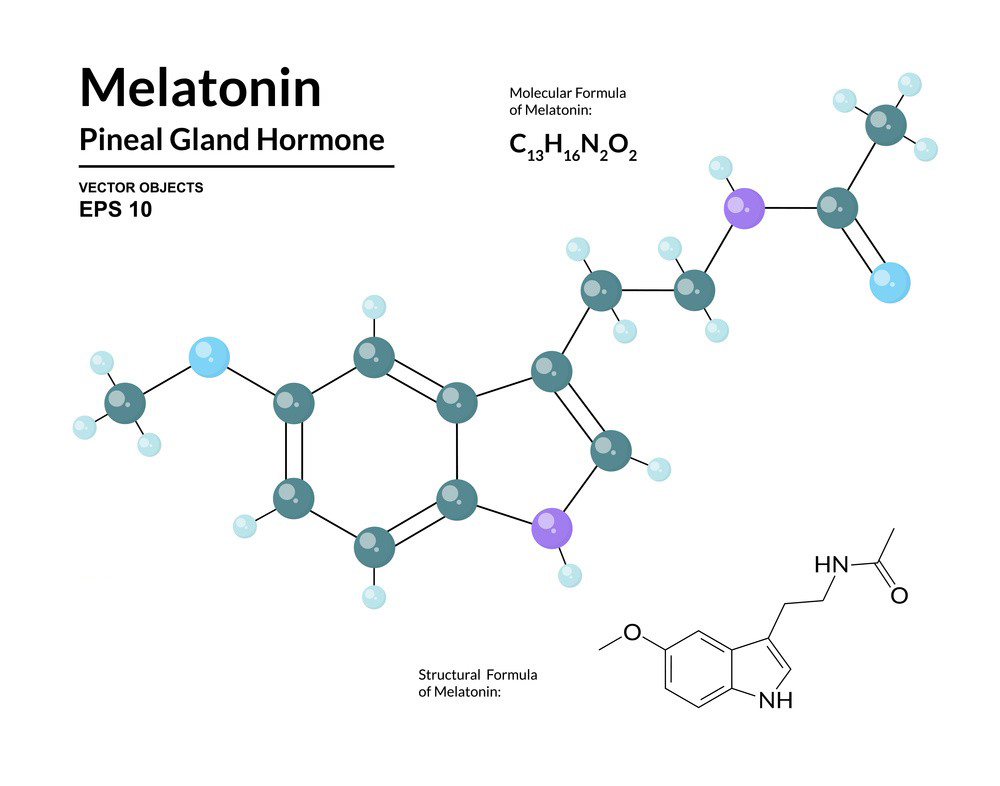The basic ingredient of melatonin is a naturally occurring hormone called “melatonin.” Melatonin is produced in the pineal gland in the brain and plays a crucial role in regulating the sleep-wake cycle (circadian rhythm) in humans and many other animals. It is often referred to as the “sleep hormone” because it helps control the timing of sleep and wakefulness. Melatonin supplements are sometimes used to treat sleep disorders and jet lag, as they can help adjust the body’s internal clock.

Efficacy and Role of Melatonin
Melatonin is a hormone that plays a crucial role in regulating the sleep-wake cycle and circadian rhythms in the human body. It is primarily produced by the pineal gland in the brain, and its production is influenced by the amount of light and darkness an individual is exposed to. Melatonin levels typically rise in the evening, signaling the body that it’s time to prepare for sleep, and they decrease in the morning when it’s time to wake up.
Here are some key points regarding the efficacy and role of melatonin:
Sleep Regulation: Melatonin is often used as a supplement to help regulate sleep patterns. It can be beneficial for individuals who have trouble falling asleep or experience disrupted sleep patterns, such as shift workers or people with jet lag. Melatonin supplements can help reset the body’s internal clock and promote sleepiness when needed.
Jet Lag: Melatonin supplements can be particularly effective for alleviating the symptoms of jet lag, as they can help synchronize the body’s internal clock with the new time zone.
Insomnia: Some people with insomnia or sleep disorders may find melatonin supplements helpful. However, it’s important to consult with a healthcare provider before using melatonin as a treatment for chronic sleep issues, as there may be underlying medical causes that need to be addressed.
Circadian Rhythm Disorders: Melatonin can be prescribed for certain circadian rhythm sleep disorders, such as delayed sleep phase disorder (DSPD) and non-24-hour sleep-wake disorder.
Antioxidant Properties: Melatonin also has antioxidant properties and may help protect cells from oxidative damage. Some studies suggest that melatonin may have potential health benefits beyond sleep regulation, but further research is needed to confirm these effects.
Side Effects: Melatonin supplements are generally considered safe when used for short periods at low doses, but they can have side effects such as drowsiness, dizziness, and changes in blood pressure. Long-term use and high doses should be monitored by a healthcare professional.
Individual Variability: The effectiveness of melatonin can vary from person to person, and its impact on sleep patterns may be influenced by factors such as age, the timing of administration, and the underlying cause of sleep problems.
Regulation and Quality: It’s important to choose a reputable melatonin supplement, as the quality and purity of melatonin products can vary. Consult a healthcare provider for guidance on dosage and product selection.
Drug Interactions: Melatonin may interact with certain medications or medical conditions. It’s important to discuss its use with a healthcare professional if you’re taking other medications or have existing health concerns.
In conclusion, melatonin is a hormone with a significant role in regulating sleep and circadian rhythms. While it can be effective for certain sleep-related issues, its use should be discussed with a healthcare provider to ensure its safety and appropriateness, especially for long-term or chronic sleep problems.
